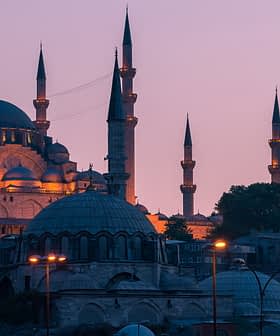Wildfire Destroys Grove in Turkey
In an ironic twist of fate, Turkey's olive trees had just been saved from proposed changes to the country's “olive law” when they went up in flames.
Fifty decares (50,000 square meters) of olive groves went up in smoke and a 100-year-old olive tree was reduced to ash, as fire raged through an olive grove in Turkey’s Aydin province on June 25. Strong winds fanned the flames and the rugged terrain making up Aydın’s Sultanhisar district hampered firefighting efforts.
A joint operation between local fire crews, the Forestry Operation Directorate and fire helicopters was undertaken but it was several hours before firefighters managed to contain the blaze, believed to have been started by a discarded cigarette butt.
In an ironic twist of fate, Turkey’s olive trees had just been saved from being ousted by industrial plants, mines and housing projects under proposed changes to the “olive law,” which would have reduced their level of legal protection.
Erkin Ilguzer, an olive grower and the owner of the Cafe Olive Art Gallery in Akkoy Village, Didim told Olive Oil Times, “Unfortunately those forest fires are very common during the red hot dry summer season.” For the past three days, almost half of Turkey’s forest firefighters have been dispatched to a blaze sweeping across Izmir which has already destroyed around 500 hectares of forest land.
In 2016, 20 acres of olive groves were destroyed along with other crops when fire engulfed farmland near the tourist resort of Bodrum. Firefighters battled for seven hours to get the Bodrum inferno under control.
The Aydin olive grove fire broke out as farmers, olive oil producers and environmentalists were celebrating the quashing of a controversial draft law which would have meant that olive groves with less than 15 trees per decare were reclassified as fields, making them vulnerable to displacement by mines, industrial plants and housing complexes deemed to be of “public benefit.”
As the fate of Turkey’s olive trees was being decided, leading politicians became embroiled in the debate. Faruk Özlü, minister of science, industry and technology sympathized with olive producers and vowed to withdraw the olive tree draft if it “harmed even one olive tree” pledging, “If I know that even one olive tree is going to be cut down because of this law, I will withdraw it.”
Meanwhile, Prime Minister Binali Yildirim criticized opponents of the changes saying, “It has been presented as if olive groves are being razed for construction. That is wrong. Those who do not want Turkey to gain competitive power are engaging in this manipulation.”
Yildirim accused the opposition of “presenting it in such a way that it is as if we destroyed olive groves,” and claimed, “Sometimes de facto situations arise. There are facilities which are constructed on former olive groves. The situation of those facilities has to be legalized. If that grove is on an industrial construction site, if there is no possibility to engage in olive agriculture, the regulation allows the industry to use the fields it needs.”
Turkey’s olive trees may be safe, for the moment, from man-made threats, but as the recent fire has shown, they remain vulnerable to natural disaster.








